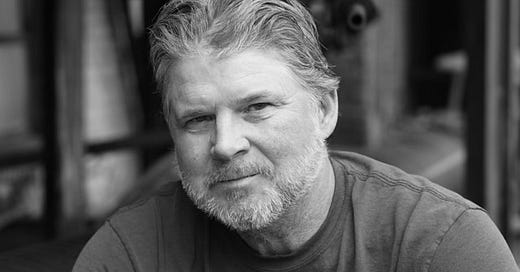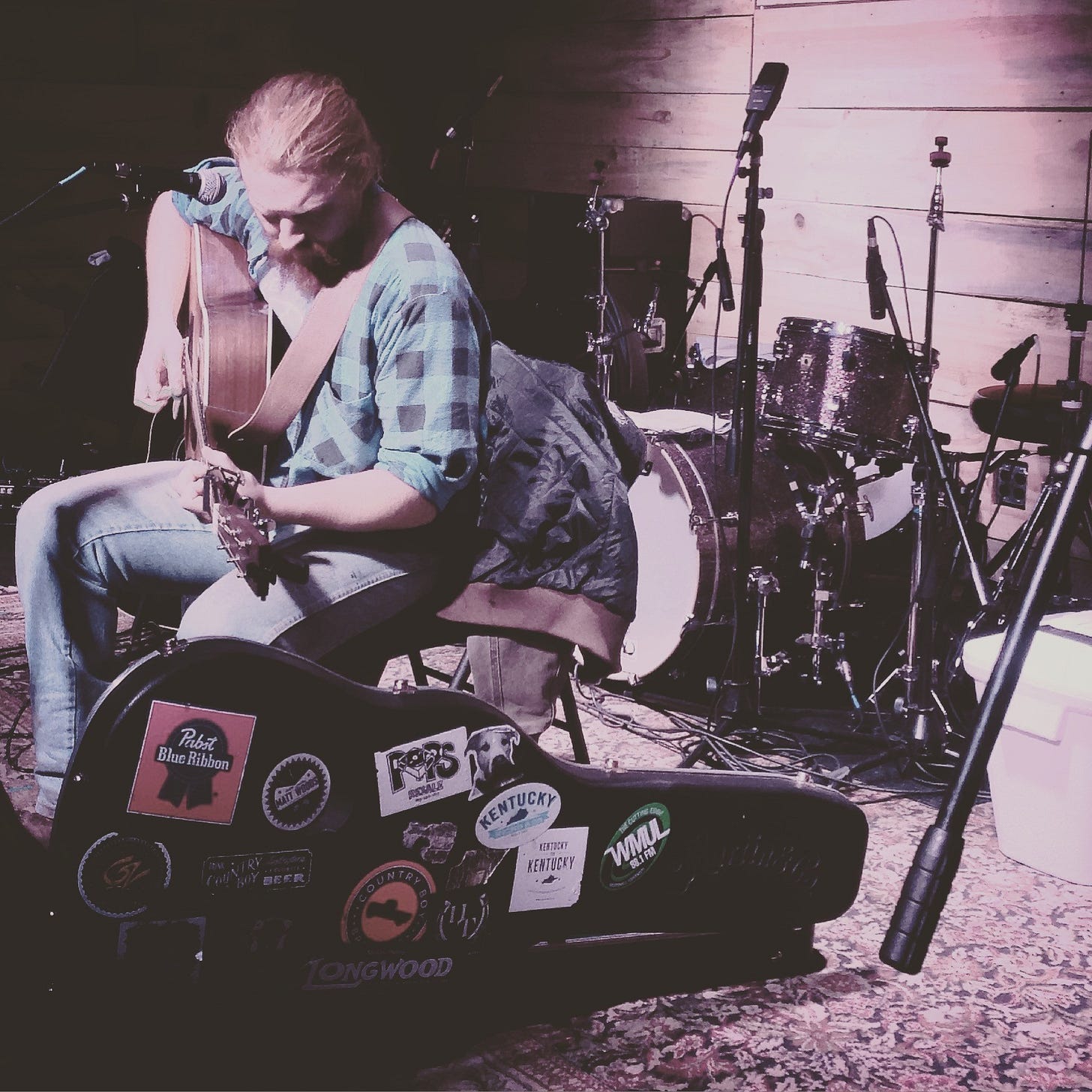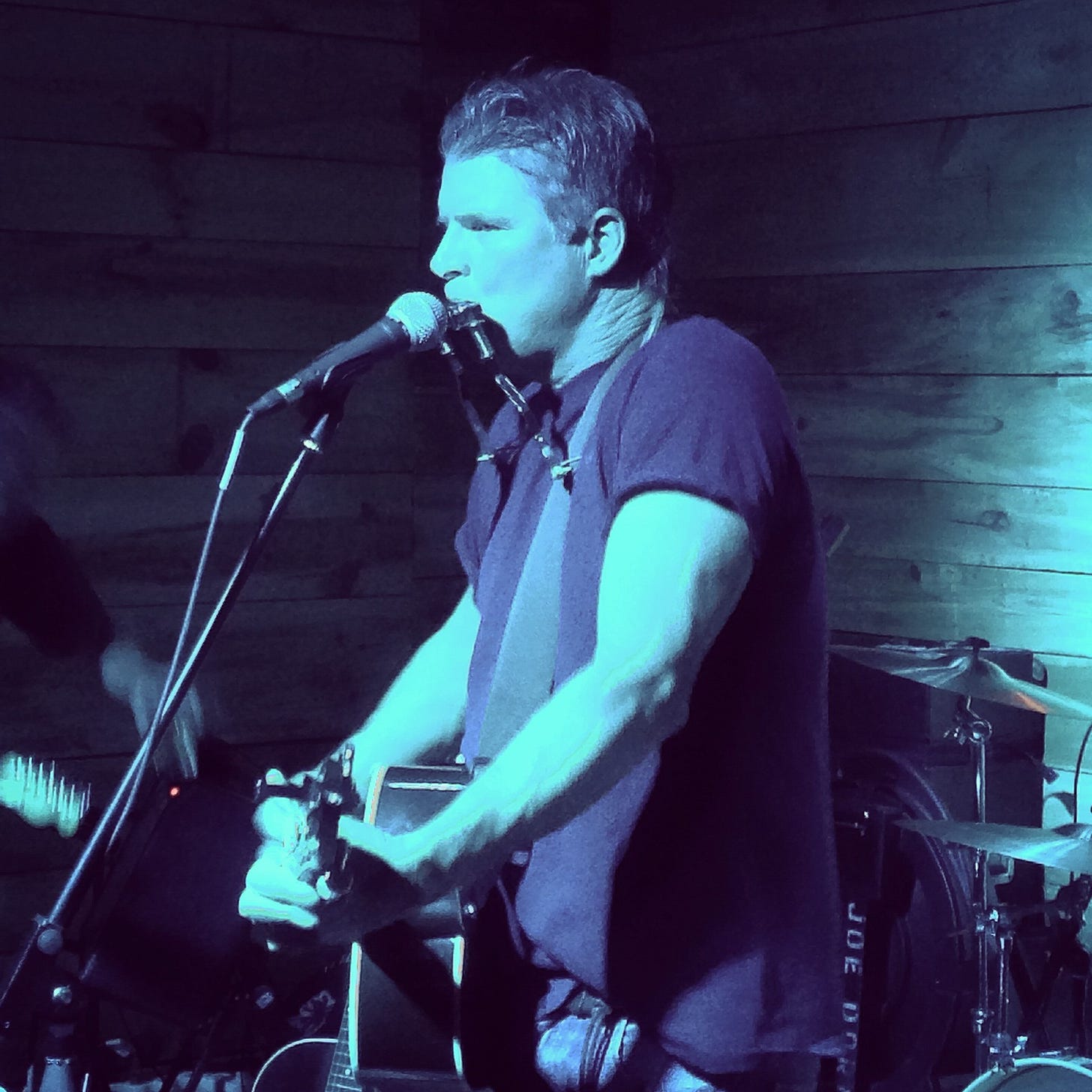Kentucky's Unsung Songwriter: A Chris Knight Retrospective, Part 1
On bathroom urinals, vengeance ballads, and the Kentucky music giant who doesn't get the credit he deserves
I will never forget the time I took a leak next to Chris Knight.
After writing that sentence I immediately recognize the need to clarify a couple of things. Let me say right off the bat that I am not a “bathroom talker.” Men’s public restrooms are sanctified spaces that should rarely if ever be desecrated by conversation. A dingy, fluorescent-lighted room with tile floors and nostril-pulverizing smells is not the place for men to be talking to each other. There is nothing so important that it cannot wait to be bandied about until flies are zipped, hands are washed, and bodies exit the room.
A strange sense of peace, of, for a moment, all being right with the world, comes over me when I’m at a sporting event or concert and I enter a crowded bathroom where no conversation is taking place (we won’t count the loud gentlemen who’ve had one too many overpriced domestics shouting at each other between stalls). We men, most of us, grasp this concept: let’s take care of business in this holy hellhole like monks: with our traps shut. We’ll get back to talking about things like the Roman Empire, World War II, and Joe Rogan when we once again migrate beyond these discolored bathroom walls. (For the record, the only one of those worth spending any amount of conversational energy on whatsoever is World War II. But I digress.)
There is nothing so important that it cannot wait to be bandied about until flies are zipped, hands are washed, and bodies exit the room.
Okay, now that that’s out of the way, I’ll move on to my second point of clarification, something perhaps equally important for the purposes of introduction: When I say I took a leak next to Chris Knight, I am emphatically not talking about Christopher Knight of The Brady Bunch and VH1 reality TV fame. I’m going to be in a completely different stratosphere from that dude. No, the man I am talking about is the revered and legendary yet still underappreciated singer-songwriter who hails from Slaughters, Kentucky in the western part of the state: the commonwealth’s own Chris Knight.
On March 20, 2015, he was playing a show at the now-defunct Lexington, Kentucky music venue Cosmic Charlie’s. A few storefronts down was the now-defunct, and legendary in its time, Lynaugh’s Irish Pub and restaurant, which is where I’m almost certain this bathroom experience occurred—because I remember cheeseburgers. When I walked into the small two-urinal bathroom and saw Knight standing there doing his business, I was shocked into speechlessness. I quickly filled the silence by breaking my hard and fast “no talking” rule, saying something like, “Holy shit, Chris Knight!” In response, he dryly chuckled under his breath.
Leading up to the show I’d wondered why he wasn’t playing at the same venue he played at last time, Buster’s (also now-defunct and replaced by Manchester Music Hall). Buster’s was a bigger venue and Knight’s shows there were always killer. I got down to business myself so as to not make the situation more awkward than it probably already was with me standing there, eyes wide and mouth agape, and asked, “Why aren’t you playing at Buster’s like you have in the past?”
When Chris Knight talks it sounds like the slow-talking, gravel-chomping, cigarette-tinged voice of God—if God sported a thick western Kentucky drawl, of course (I hope he does, for the record). I’m not even sure if the man smokes or ever did.
“Last couple times at Buster’s we had issues gettin’ paid,” he said.
“No way,” I said. “That’s messed up.”
“I know man. Gotta get paid. Cosmic seems like good people so far.”
“Well, I hope they do you right.” Then, sensing we were about to part ways and wanting to get it out before I missed my chance, I said, “I think you’re an amazing songwriter, man. I’m a huge fan. I love all your stuff. Can’t wait for the show tonight.”
“Thank ya, man. Appreciate that.” He said the word “appreciate” as if it started with a p. And that was it. I don’t remember who washed up and departed the no-talking zone first, but to this day I’ve always regretted that I didn’t address the man as “sir.”
When Chris Knight talks it sounds like the slow-talking, gravel-chomping, cigarette-tinged voice of God—if God sported a thick western Kentucky drawl, of course.
It’s ironic that one of my clearest memories of being starstruck involves meeting someone who is the furthest thing from a “star,” and who gives off vibes which make you think that becoming one never topped his list of priorities as an musical artist. His 1998 debut self-titled album, Chris Knight, was on a major label, MCA Nashville, and co-produced by Frank Lidell, who would go on to produce albums for Miranda Lambert, Kelly Pickler, and Lee Ann Womack (whom Lidell would eventually marry; if you don’t know Womack, you know her hit song), so the possibility for stardom was certainly there. I wouldn’t necessarily call it his best produced album though it’s certainly the one that sounds the best. It somehow strikes the balance between having that exquisite major-label-money-backed sound and never actually sounding overproduced. It just sounds expensively good, expensively crisp, expensively clean.
None of that would matter without worthy songs, however, and the album has them in spades. From the wrongly accused unreliable narrator of live staple “Framed” to the “one’ll kill you one’ll keep you alive” guessing game of “Love and a .45” to the music-induced heartbreak of “The Band is Playing Too Slow,” it’s pretty much flawless, and one of the great country-rock debuts of not just the nineties but of all time.
But stardom was not in the cards for Chris Knight. That now seems obvious looking back. There are no songs on his self-titled debut that seem like they would have fit with late nineties country radio, which isn’t to say that nineties country radio was terrible; it wasn’t, and it’s been enjoying a nostalgic wave of resurgence for a few years now. But the songs on Chris Knight are a bit too clever, the music is a bit too rocking, his voice is a bit too unpretty, and the themes bend a bit too far in the direction of revenge and murder, self-loathing and regret.
The songs on Chris Knight are a bit too clever, the music is a bit too rocking, his voice is a bit too unpretty, and the themes bend a bit too far in the direction of revenge and murder, self-loathing and regret.
The first song I ever heard by Knight is about some of those very things. It’s probably his most famous (although second most streamed) and definitely his longest (almost seven minutes). It’s called “Down the River,” from his second album A Pretty Good Guy (2001), and in it the narrator takes vengeance into his own hands for the death of his brother Walter. Reading through the lyrics reminds me why I love Chris Knight so much—he is, in my opinion, one of the most unsung literary voices Kentucky has. The man is a poet, he’s a storyteller, and he packs just as much into this seven-minute song as many writers do into a twenty-page short story. But when I first heard it, it was the music and Knight’s voice that demanded my attention.
I was at a friend’s house just hanging out, drinking beer, and listening to music, as friends in their mid to late twenties do. This was back in the days when you connected an iPod pre-loaded with songs to a portable speaker via an aux cord. Out of the blue another friend who was there said, “Y’all gotta hear this song.” He pressed play and the moody, deliberate chords of an acoustic guitar rang out as Knight sang, “I was eighteen / My brother was twenty-one.”
Every time I try to describe his voice I feel like my words woefully undersell it and I drift into cliche, but the most succinct way I can put it is this: It’s quintessential Kentucky. More so than Sturgill Simpson, Chris Stapleton, or Tyler Childers, all of whom are fantastic in their own right, it is Chris Knight’s voice I think of when I think of the purest distillation of Kentucky—the place, the history, the culture; the passion, the anger, the people, hard and lovely. “Down the River” is the perfect vehicle for it, selling the haunting, unsettling tone with a nonchalant narrative authority that dares you not to listen. All that to say, I loved the song, and him, immediately.
There is a key moment in the song that always gets the strongest reaction during his live shows. I have never owned a gun. I don’t even really like guns, and the first time I fired one when I was twenty-four years old, my hands shook like jelly. But when Knight sings the words, “I put a bullet in his head / And dropped him in his tracks,” I feel a giddy, almost maniacal jolt of satisfaction. Even more glorious is the way Knight goes right back into the song’s refrain without missing a beat: “And we went down the river.” There is something so satisfying about the matter-of-factness of it. The narrator did what he had to do—avenged his brother—and then kept right on moving.
It’s both electrifying and disturbing to witness the moment Knight sings this live. I sing it loud with the crowd every time, and then I think too much for a few seconds about how we all just joyfully sang at the top of their lungs about killing someone with a headshot. Hey, all things considered, at least it was a righteous kill. And the murder ballad has a long and storied tradition in roots music, after all.
Here’s the thing: I don’t think Chris Knight is trying to whip us up to a violent frenzy. Hell, he might even think it’s weird that people sing that line the loudest. I don’t think he wants everyone in the crowd to go back to their rural or urban enclaves, think about someone who’s egregiously wronged them, and then take justice into their own hands. “Down the River” is a cathartic song about bloody retribution, but it’s also a horrifically sad story about the cyclical nature of violence, how addicting it can so easily become. The song’s tone cannot exactly be described as celebratory. There’s a bit of a lazy, dirge-like tempo to it, almost as if to memorialize the tragedy of it all. It’s a subversive elegy, but really not all that subversive when you stop and think about it.
This kind of depth is one of the things I love most about Chris Knight. When you hear him talk he comes across as an unassuming good ole boy who likes to take his time with words. His live shows are excellent, but I’ve never caught one where he’s big on between-song banter. He lets the songs do the talking, and for good reason: I’m not sure the man has a bad one in his catalogue. He usually plays with a group of equally unassuming guys, most of whom are at least in middle age. The first time I saw him at Buster’s, I was obsessed with his bass player’s hair. He was a shorter, older guy just laying down the groove, sure and steady, and this wisp of hair stayed stuck up on the front of his head, bouncing and bobbing all night. I thought it was awesome. I wanted to be that cool in my sixties.
Another time I saw him play at The Burl, which is probably the best music venue in Lexington and is absolutely thriving in the year of our Lord 2024. It opened in July 2016 and this show was in October of that year. The room was as packed as I’ve ever seen it, possibly due to a locally-revered-but-not-yet-world-famous opener named Tyler Childers. He thrilled the crowd with a solo acoustic set. This was ten months before he would take the music world by storm, becoming a—what’s the word?—star with the release of his major label debut album Purgatory in 2017. Childers, obviously moved by the creative debt he felt he owed to Chris Knight, talked about the strong influence he’d had on his songwriting, and considered it a honor to open for such a legend.
Childers, obviously moved by the creative debt he felt he owed to Chris Knight, talked about the strong influence he’d had on his songwriting, and considered it a honor to open for such a legend.
I seem to recall in The Burl’s early days, their stage seemed to barely be a foot off the ground (it’s much higher now). A drunk dude kept trying to touch Knight’s mic and looked like he might have been trying to get a hand on the man himself. I kept waiting for Knight to slug him; in fact I was sure that it was going to happen. But he rolled with it like a champ, ignoring the drunk dumbass to the extent that it was possible. As the man kept annoying him, I wondered if I was the only one seeing it because nobody else seemed to notice and none of the staff seemed to think it was necessary to do anything (to be fair, they weren’t as close as me). I flashed back in my mind to when Knight and I had the bathroom conversation several years prior and he told me he was never playing Buster’s again. He’s never going to want to play The Burl again, I thought. This idiot has ruined it for everybody. I momentarily thought this was the last time Chris Knight would ever play in Lexington. Mercifully, I turned out to be wrong. He’s played The Burl several times since.
In December of 2018, I saw him play Austin City Saloon (meh). I remember thinking at the time that it was a weird venue for him to play, but maybe he needed a break from The Burl after all. The show was seemingly highly anticipated as it was the 20th anniversary tour of that stellar debut album. I bought a t-shirt commemorating it, still one of my favorites to this day. I had also, six days earlier, just proposed to the woman who is now my wife. She’d already made other plans that night, but I was ready to celebrate and enjoy the show with my dad who ended up going with me.
I never have a bad time at a Chris Knight show, but there was something off about this one. It was probably the least attended of his shows that I’ve ever seen, but also one of the loudest in terms of talking, and nothing makes me angrier than people talking over someone as good as Chris Knight. What made things worse was that another artist was apparently scheduled to go on after him, someone younger and louder, someone I’d never heard of but who apparently had a sizeable fanbase.
It started to become clear that most of the people trickling in during Knight’s set were there for this other dude. My dad and I decided to hang around to see what he was all about. When he played his first song, the electric guitars were cranked up like they thought they were playing Wembley, the strobe lights flashed like a haunted house trying too hard, and the crowd fist-pumped in unison like obnoxious UFC fans. It all hit me at once and I decided emphatically that I did not need to stick around for whatever this was. I looked at Dad and said, “I’m ready to leave if you are.” I haven’t been back to Austin City since. The disrespect to Knight, whether intentional or inadvertent, was something I could not abide.
*A note on upcoming posts: Over the next few posts here at my nameless Substack (suggestions welcome) I’ll be talking about a few more of my favorite Chris Knight songs, writing about what they mean to me, the memories they spark, the stories they tell. I have, with you in mind, dear reader, decided to break this piece up into three or four parts, or else this might have been a half hour read or longer. Writing this has been an endeavor in rediscovering not only what an incredible songwriter Chris Knight is but also what a deft and literary storyteller he has always been, going all the way back to that first album. He’s truly one of Kentucky’s great musical and artistic treasures.
Read part two here: Riding Hard Luck: A Chris Knight Retrospective, Part 2








